BOARDWATCH: Protesters continue to challenge Chicago Board of Education at June 26 meeting
If you weren't a protester, but simply a pedestrian on Clark Street north of Adams, on Wednesday, June 26, 2013, at around 10:30 a.m., you really had to squeeze your way between all the protesters marching, displaying messages on posters, and chanting in front of the Chicago Board of Education Building at 125 S. Clark Street. Once again, hundreds of people were protesting before the Board's monthly meeting. What were they so riled up about, some passersby asked? Many things, but most notably: the closing of 49 schools and the budget cuts that would wreak havoc on schools. Both had been done to the city's public schools by the Board during the previous six weeks, and people were very angry about it.
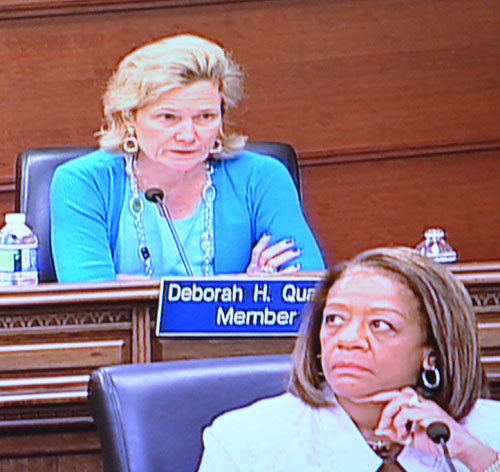 Chicago Public Schools "Chief Executive Officer" Barbara Byrd Bennett glances over her shoulder at the newest member of the Board, Deborah Quazzo, during the Board's June 26, 2013 meeting. Substance photo by George N. Schmidt.The Board members who were present at the Board meeting were Dr. Henry Bienen, Dr. Mahalia Hines, Board Vice-President Jesse Ruiz, Board President David Vitale, Andrea Zopp, and new member Deborah Quazzo (a self-described "investment banker by trade"). Dr. Carlos Azcoitia was absent.
Chicago Public Schools "Chief Executive Officer" Barbara Byrd Bennett glances over her shoulder at the newest member of the Board, Deborah Quazzo, during the Board's June 26, 2013 meeting. Substance photo by George N. Schmidt.The Board members who were present at the Board meeting were Dr. Henry Bienen, Dr. Mahalia Hines, Board Vice-President Jesse Ruiz, Board President David Vitale, Andrea Zopp, and new member Deborah Quazzo (a self-described "investment banker by trade"). Dr. Carlos Azcoitia was absent.
As usual, "Good news" preceded the business portion of the meeting. Northside Prep High School was recognized for student achievement. Two of the college destinations for students were Stanford and Alabama State (on a Fulbright Scholarship). According to students, their parents and counselors were the greatest influence on them.
The business portion of the meeting followed immediately, and it would be nearly an hour before anyone who wanted to speak to the Board would be heard during "Public Participation."
Chief Executive Officer (CEO) Barbara Byrd-Bennett updated the Board members on the transition from closing schools to what CPS had dubbed "Welcoming schools." The transitions following the Board's May 22 vote to close 49 of the city's real public schools -- the largest school closings in United States history -- is planned for this Fall. Byrd Bennett said the five components for the transitions are enrollment, safety and security, culture, transition, and funds.
She told the Board members that over 125 events, picnics among them, which were held to help students transition and to bring the communities together. She introduced Minnie Watson, principal of Oscar De Priest Elementary School in the Austin community, to describe one such transition. DePriest, a Pre-K to 8th grade school at 139 S. Parkside, is a "Welcoming School." She also introduced Shirley Scott, principal of Duke Ellington Elementary School, at 243 N. Parkside, which will welcome students from closing schools Emmet Elementary at 5500 West Madison Street and Key Elementary at 517 N. Parkside.
Each principal gave a Power Point and spoke about the many activities which have been held to welcome students and parents to their new schools. Byrd Bennett told the Board that nearly 90 percent of the students forced into these transitions had signed up for the welcoming schools.
Next, Jennifer D. Vidis ("Chief of Schools, Alternative Network") gave a Power Point presentation on the expansion of what she called "Option Schools" for "Out-of School and Off-Track Youth" who are not currently enrolled in school. Garfield Park, Roseland, and Pilsen were targeted. Englewood will be targeted. (At this point, a member of the audience was removed by security for shouting out about what had happened to her brother.)
Ms. Vidis told the Board that what she called a "comprehensive strategy" will be followed. One unfamiliar term she used, in regard to the school system, was "dashboard." Non-traditional scheduling has been planned. Faith-based organizations will be utilized. Students will be surveyed as to why they came back. Phone calls and knocking on doors of missing students is also planned.
The Board members asked questions.
Alluding to the "dashboard" (on the Board's computer Website and other technical stuff) Board member Dr. Mahalia Hines said that principals need to be educated face-to-face and not just get information on-line. She also asked about the many students who are put out/pushed out from charter schools, being careful to avoid calling those students "pushouts".
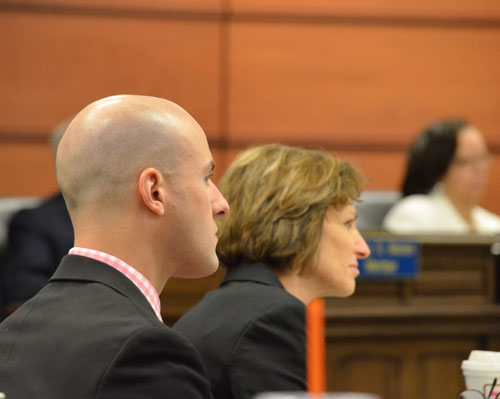 None of the Board members asked Barbara Byrd Bennett why the Board needed a $165,000 per year "Chief Officer for Innovation and Incubation" when Byrd Bennett referenced Jack Elsey (above) during her report. Elsey, who was hired by the Board from out--of-town in the newly created position in December 2012, has no Chicago teaching or administrative experience, but is paid more than the highest paid principal and the "network chiefs" during a year when austerity is supposedly forcing massive cuts on the city's real schools and the largest number of closings in U.S. history. Substance photo by George N. Schmidt.CEO Barbara Byrd-Bennett responded with references to the "Office of Innovation and Incubation" and the "Chief of Chiefs." She then told Dr. Barker, the Incubation and Innovation peson, a staff member, "You'll have that ready tomorrow?"
None of the Board members asked Barbara Byrd Bennett why the Board needed a $165,000 per year "Chief Officer for Innovation and Incubation" when Byrd Bennett referenced Jack Elsey (above) during her report. Elsey, who was hired by the Board from out--of-town in the newly created position in December 2012, has no Chicago teaching or administrative experience, but is paid more than the highest paid principal and the "network chiefs" during a year when austerity is supposedly forcing massive cuts on the city's real schools and the largest number of closings in U.S. history. Substance photo by George N. Schmidt.CEO Barbara Byrd-Bennett responded with references to the "Office of Innovation and Incubation" and the "Chief of Chiefs." She then told Dr. Barker, the Incubation and Innovation peson, a staff member, "You'll have that ready tomorrow?"
CEO Barbara Byrd-Bennett then spoke about the budget deficit, needed cuts, the decline in Federal, State, and Local funds, and pension payments. She added that on May 31, the state legislature adjourned without legislating pension cuts, that cost-saving options are being sought, additional revenue is needed, and that lasting/not temporary solutions are being sought.
Before public participation began, Board President David Vitale then reminded everyone that they could call 773-553-1600 to schedule an office visit with a Board member.
He added that the next Board meeting will be on Wednesday, July 24, 2013, at 125 S. Clark Street, and that registration for public participation will take place Monday, July 15th at 8:00 a.m. and close Friday, July 19th at 5:00 p.m., "or when all 60 speaking slots are filled." A bulletin handed out at Board headquarters also stated that registration will be online at www.cpsboe.org (recommended), by phone at 773-553-1600, or in person at 125 S. Clark Street, 6th floor. The bulletin also mentioned that, "The Public Participation segment of the meeting will begin as indicated in the meeting agenda and proceed for no more than 60 registered speakers for the two hours."
One thing Vitale didn't mention, but which would become obvious as soon as "public participation" began. By capping the computer sign-in at 60, Vitale and the Board were guaranteeing that the public was gagged. Every month, the sign-in sheet lists 60 names, but fewer and fewer of those on it actually take the podium. At least 24 of the sixty names on the June 26 sign-up list were "no shows." (One person was signed up twice.) Despite these realities, the Board continues to cap the list of those officially allowed to speak at 60.
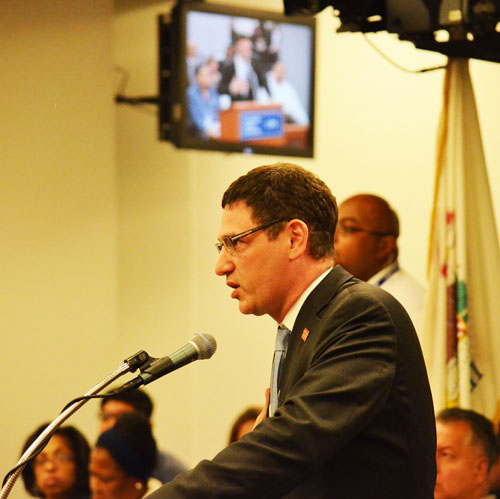 Chicago Teachers Union vice president Jesse Sharkey told the Board that the combination of the school closings and the new budget procedures were disrupting the city's real public schools. None of the Board members noted that the Board agenda called for opening "new seats" in the privatized "Alternative Options" schools and programs that the Board would approve at the June 26 meeting. Substance photo by George N. Schmidt.Public participation began with Jesse Sharkey, Chicago Teachers Union (CTU) Vice-President. He told of the deep painful cuts that schools are facing and the harm the cuts would do to kids. He asked the Board to tell the truth about the reality of the budgets. He wanted to know, "What are we facing? What does the picture actually look like?" He remarked that cutting pensions would take food out of the mouths of retired teachers who don't get Social Security. He added that revenues are needed as well as a fair income tax. He questioned the TIF stadium planned for De Paul University.
Chicago Teachers Union vice president Jesse Sharkey told the Board that the combination of the school closings and the new budget procedures were disrupting the city's real public schools. None of the Board members noted that the Board agenda called for opening "new seats" in the privatized "Alternative Options" schools and programs that the Board would approve at the June 26 meeting. Substance photo by George N. Schmidt.Public participation began with Jesse Sharkey, Chicago Teachers Union (CTU) Vice-President. He told of the deep painful cuts that schools are facing and the harm the cuts would do to kids. He asked the Board to tell the truth about the reality of the budgets. He wanted to know, "What are we facing? What does the picture actually look like?" He remarked that cutting pensions would take food out of the mouths of retired teachers who don't get Social Security. He added that revenues are needed as well as a fair income tax. He questioned the TIF stadium planned for De Paul University.
Next, Georgia Walker talked about the impact of the budget cuts on Beard School, a special education school. She said that one of every 50 children in the USA today is autistic, according to some estimates. She said that her daughter was a non-verbal child who can now express herself because of the Beard teachers, but that the massive cuts being imposed on Beard would end those hopes for children on the autism spectrum.
Mary Cooper of Chicago International Charter Schools (CICS) Wrightwood, a parent and a Parent-Teacher Organization (PTO) president, thanked the Board and said that charter schools deserve equal funding.
Shauna Reitz, a Local School Council (LSC) chairperson at the overcrowded Wildwood Elementary School on the Northwest Side said two changes had taken place since the last meeting and thanked staff members for the short-term solutions. She said that even a bathroom is being converted to an office, but because of the budget cuts, they can no longer afford a teacher for pull-out groups. She said the school is a model and quoted CEO Barbara Byrd-Bennett that we are a "smart investment." Standing with Reitz was Wildwood principal, who had spoken about the overcrowding at the May 22 meeting.
Martin Ritter, who signed in "West Loop", where he lives, spoke of the need for a real public high school on the near West Side. Turning to CPS finances, he said that banks have not dropped interest rates for the Chicago Public Schools (CPS) and renegotiation of 'swap" agreements is needed. He asked CEO Barbara Byrd-Bennett if CPS is really finding the funding that the city's public schools need.
Ritter's comments drew extensive pplause from the audience.
Bringing up a unique way of calling attention to CPS finances, Kathy Murray, of the CTU, asked that 708-364-330, Orland Park School District #135, be called. Murray said that Orland Park had renegotiated their debt with lenders and now can pay off its loans early. She added that no one answers the phone at CPS, new revenues are needed. She mentioned the student with her wanted to know about the promised i-pads.
Bonita Robinson, a retired Reading specialist, told the Board she opposed to the closings. She noted that the names of the schools that were being closed were not even spoken at the May meeting when the vote to close them took place. She mentioned a Sun-Times column by Mark Brown where he talked about CEO Barbara Byrd-Bennett quoting Dr. Martin Luther King, Jr. and said that he was sure Dr. King would not have favored that use of the quote ("doing what is right"). Ms. Robinson also mentioned a quote by Nelson Mandela about the way society treats its children.
Adenia Linker, of Lane Tech High School, said she felt there was no constitutional basis for Common Core Standards. She added that she believed that a single high school curriculum will lead to lower levels of literacy for all high schools. She said that most states have rejected Common Core. She remarked that you know in your heart that there is no common experience.
(Applause from the audience.)
Stephen Asme, who was just given a Fulbright opportunity to go to Beijing for five months, was told that if his son leaves LaSalle Language Academy to accompany his father, the son will lose his position at LaSalle. He said his son is learning the Chinese language at LaSalle Language Academy and would not be guaranteed re-entry if he left for less than a year. He said he feels that the Board needs to make exceptions. He was told that Dr. Gurley will investigate.
(Applause from audience.)
Dr. Henry Bienen remarked that there was no reason to be subjected to the lottery again and that there is no issue too small for us to deal with.
Eric Johnson, of the Illinois Network of Charter Schools, spoke of the latest Credo Report from Stanford University. According to Johnson, the report said that charter schools in Chicago made greater gains and performed better than regular public schools. He encouraged Board members and others to read the report.
Chatunda Tillman, of the Englewood-Gresham Network, brought the subject back to increasing finances. He said he had concerns about toxic swaps and Garrett Morgan Elementary School. He said that Garrett Morgan's scores were better than Ryder's, yet Garrett Morgan students were being forced to go to Ryder. He added that Garrett Morgan already has an elevator, which would need to be installed at Ryder. He also said that the hearing officer named the schools, Garrett Morgan being one of them, that should stay open, and asked if the Board could take the hearing officers at their word and keep the schools open that they recommended not be closed. He added that Wal-Mart had paid for the hearings.
Tori Benson spoke angrily of a $900,000 budget cut at Portage Park Elementary School, where she is LSC chair. She has a son with high-functioning autism. She said that after paying for classroom expenses, there would be $185,000 at the school for all other expenses, which would equal $160 per child per year. She added that Tax Increment Financing (TIF) should be sent to schools, not to businesses, and we need a great well-rounded education.
Kalemate Muhammad, of the Bradwell School of Excellence, spoke of his two sons' need for vegan lunches. Without the opportunity for vegan lunches, he is required to provide for this need himself.
Wendy Katten, the director of Raise Your Hand, spoke of the 80 million dollars in school-based cuts at Burley Elementary School. She said Burley won Excellence in Reading Awards, yet the Reading specialist was cut last week. She wanted to know if the school closings added to the deficit this year. She remarked that you've added programs, charters, and International Baccalaureate (IB) that's not real IB. She said that there is a new CEO every year who doesn't know what going on and the pension issue doesn't even deal with CPS teachers. She inquired if a Pension Holiday is wanted.
Andee Harris, of Burley Elementary School, who told the Board she is in the business world, said that schools should not be run like businesses.
She said that there was a longer day, but there were cuts in Art and Music, etc. She said that the teachers wear many hats besides "teacher." She said that schools were expected to do more with less, that 35 or more students could be in each classroom, and that transparency and honesty is needed from the Board. She added that she had stayed in the city on purpose.
Robert Jewell, of Ad-ucation Media, LLC, took the floor to promote his company's product. He said they offered a way for districts to raise money while enhancing pride. He spoke of putting messages (100-200 paid public service announcements per month) on the walls of schools for which they would give the schools money. It was referred to Tim Cawley.
Rochelle Davis, President and CEO of Healthy School Campaign (HSC), spoke of the food service contract that was to be voted on today. She wants to work with CPS. Jose Hernandez, of Calmeca, talked to the Board about the food service contract. He remarked that healthier students perform better academically. Liliana Hernandez, of Eli Whitney Elementary School, a parent and an LSC member, spoke in Spanish which was translated, about being a new food service provider. She wants to help educate the parents regarding food offerings and provide a feedback mechanism for parents and students.
Christopher Ball, of More than a Score, wanted to discuss the performance policy. He is against redundant high stakes tests and added that our children are more than a score.
(Applause from the audience.)
Caroline Bilicki, a parent of three at Disney ll, asked the Board to reconsider the 2011 decision for admittance. She wanted the Board to include magnet school teachers so that their children could attend the magnet schools where their parents teach. She said this would provide stability.
Jesus Campuzano, of Southside Together Organizing for Power (STOP), said he is fed up with the Board for firing teachers, closing schools, and slashing funds. He labeled them the Board of Destruction. He asked, "Where do you get money for charter schools if there is no money?" He claimed that the Board would rather help the super-rich. He told the Board to stop giving money to charters and use TIF money for public, not charter schools.
At this point, students who were standing with Jesus Campuzano turned and faced and spoke to the audience. A woman stood and yelled out, "Barbara Byrd-Bennett, you're a liar!" Another speaker stood and called out, "Barbara Byrd-Bennett, you're under the thumb of Rahm Emanuel." Chants of "Whose schools? Our schools?" rang out. Another person called out, "We are not going without a fight. You will see us again." Xian Barrett was heard saying, "I'm just here for the students," as he was escorted out. Another remark that was shouted out was, "Barbara Byrd-Bennett, you should be ashamed of yourself." After security had finished removing people, the next person came to the podium.
Marcella Holmes, of Ravenswood Elementary School, talked about the bullying of her daughter. She said the principal had said that if our children fought, they were going to go to jail. She said that would mean her child would have a criminal record. She felt there had been retaliation and that her daughter was suspended even though she was attacked first. She was told the name of a staff member who would help her.
Ronald Jackson, who was sitting in the audience, was escorted out after yelling out.
Mel Rothenberg, an Economist, who is a retired professor from the University of Chicago, told the Board that they needed to take seriously the outburst that happened a few minutes ago. He advised the Board to send a letter to each school telling of the budget cuts. Regarding the funding shortfall, he felt the Board should have sought out new funding that is available, for example, a tax on financial transactions. He also felt the Board should get its fair share of TIF funds.
Gabriella Iselin, of Mather High School, expressed the feeling that this was a humiliating meeting, that there were no straight answers, and that the audience had been give mullarkey about rebuilding trust. She asked, "Why can't you reach out to the base and do something?" She expressed concern about the TIF funds, and asked, "Why don't you call on friends and the mayor?" She said straight answers are needed.
Hannah Hayes, a Whitney Young High School parent, spoke of Hyde Park and Canter being phased out while appeals from parents fell on deaf ears. She said that we thought the cuts would not affect the classrooms and asked the Board, "Do you really believe these cuts will not impact the classrooms?" She added that you have brought us together to fight for our schools and we need a new mayor.
Jeff Karova, of Friends of Darwin Elementary, whose daughter was in Pre-K in 2012-2013, wants to increase awareness of funds raised. He asked for stability, transparency, and advocacy. He remarked that it is hard to convince a parent to send a child to a public school next year when they don't know where their child will be. He added that Darwin had lost 700 thousand dollars and that he was a CPS grad.
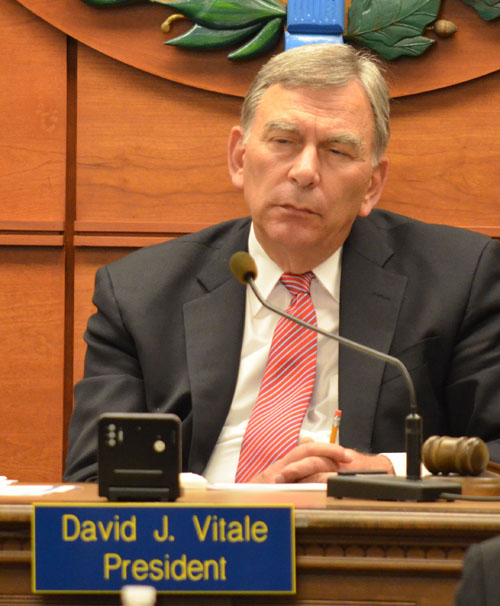 Board President David Vitale often ignores the more passionate speakers during the ever lower turnouts at public participation. Above, Vitale during the remarks by one parent critical of the Board's attacks on special education. Substance photo by George N. Schmidt.Windy Pearson, of Erickson Elementary School, told the Board that when two elephants fight, the grass gets trampled on. She said that in this case, the grass happens to be our children. She said that extra time (the longer day) was a cruel joke because Music and Art, etc., had been lost. She asked the Board to renegotiate with the Bank of America. She added that you knew when you chose to shut down those schools, that there would be cuts to the budgets.
Board President David Vitale often ignores the more passionate speakers during the ever lower turnouts at public participation. Above, Vitale during the remarks by one parent critical of the Board's attacks on special education. Substance photo by George N. Schmidt.Windy Pearson, of Erickson Elementary School, told the Board that when two elephants fight, the grass gets trampled on. She said that in this case, the grass happens to be our children. She said that extra time (the longer day) was a cruel joke because Music and Art, etc., had been lost. She asked the Board to renegotiate with the Bank of America. She added that you knew when you chose to shut down those schools, that there would be cuts to the budgets.
Nelson Sosa, of the Pilsen Alliance, who identified himself as being part of the Grassroots Education Movement (GEM), wanted to propose an alternative to budget cuts. He said that the bankers and millionaires are running the schools and that there are no transparencies at the BOE. He asked, "Why are we here? The money from the poor goes to the bankers. Our kids have no more money to give the banks."
Alfred Rodgers, of the Latino Organization of the Southwest, asked, "Why can't the mayor and this Board go to the governor and put out their hand?" He addressed the mayor, "Forget the casinos. Stay on course for the children." He wanted to know, "Where does the money go?"
Nellie Cotton, of Grimes-Fleming, remarked that this was the worst year ever; we weathered every single assault from you. She claimed that this year was fantasy. She asked, "There are no funds for education? but there is money for a stadium and charters?" She said that charters are not public schools. She added that principal autonomy regarding budget cuts shows your cowardice regarding cuts. She told the Board that school budget cuts are the same as one sheet of toilet paper.
Members of the Board responded with the following comments.
Board President David Vitale said that no budget has been approved yet. We have a significant financial problem and we understand that. We said we would try to minimize the impact on the classroom.
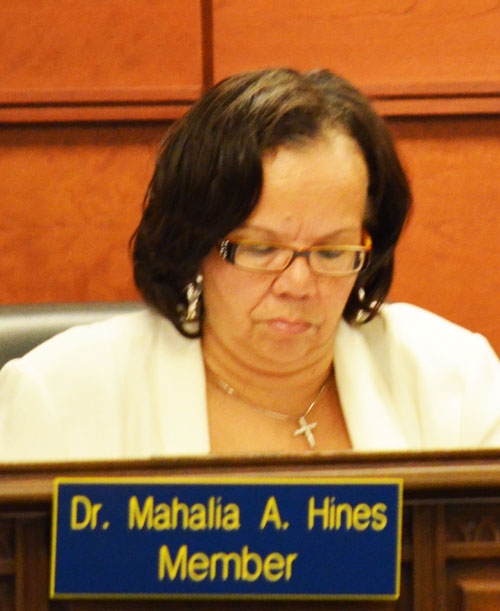 Board member Mahalia Hines told the public that really good principals could run their schools with reduced budgets and 35 children in classes. Substance photo by George N. Schmidt.Board Member Dr. Mahalia Hines told the public that it "bothers" her that people think that this is a pleasant task. She mentioned that she is a former principal and teacher (for 35 years) and understands cutting. She added that the really great principals were able to continue.
Board member Mahalia Hines told the public that really good principals could run their schools with reduced budgets and 35 children in classes. Substance photo by George N. Schmidt.Board Member Dr. Mahalia Hines told the public that it "bothers" her that people think that this is a pleasant task. She mentioned that she is a former principal and teacher (for 35 years) and understands cutting. She added that the really great principals were able to continue.
(Groans and "Oh! Come on!" from the audience.)
She also said, "You can't just find money."
Board Vice-President Jesse Ruiz referred to a Sun-Times piece and Gery Chico (former Chicago BOE President), state funding, and property taxes. He remarked, "We do feel it." He said that people keep telling him things, such as, "Thanks for my lay-off from CPS." He informed everyone that a lot of ELECTED school boards have failed their students, naming four, in particular. He also said that misinformation has been put out there. He added that there are no national standards in regard to Common Core, which has not been adopted by Texas and Alaska, but has been adopted by most states.
Andrea Zopp spoke of wishful and magical thinking, as if there was a pile of money in the Bank of America or TIF. She said that we will look at legitimate issues raised by teachers. She added that pension expenses alone are going up while revenue is going down. She told Jesse Sharkey that the argument about Common Core not being good for our schools is shocking. She said Common Core will be good for all our kids regardless of zip code.
Board Member Henry Bienen spoke about the closings and the economy. Claiming an expertise in "economics," Bienen said that previous claims about the way the Board estimated savings from the school closings were wrong. When Wendy Katten of the Raise Your Hand Coalition stood up and spoke loudly that Bienen was misrepresenting what she had said during her testimony, she was grabbed by security and removed from the room.
Other comments were made about the choice of food vendor and transportation.
The meeting ended about three hours after it had begun.

